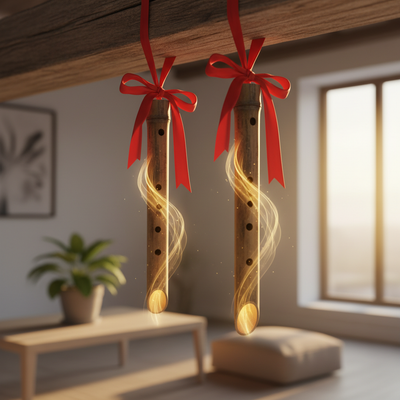The Two-Door Problem

Having a bedroom with two doors can feel uncomfortable, and you're right to wonder about how it affects your home's energy. This design feature is common in master bedrooms that have attached bathrooms or private balconies, and it can create a quiet but ongoing feeling of unease. The main question is: does this mess up the peaceful feeling of your personal space? The simple answer is yes, it can, but it's a Feng Shui problem that you can definitely fix.
The secret to solving this issue is learning about and controlling the flow of energy, called Qi, in your room. A bedroom's main job is to be a safe place for rest, recovery, and closeness. Its energy should be gentle, slow, and caring—like a calm, still pond. When two doors are in the room, the energy can become too busy and fast, creating a current that stops the room from feeling settled. This guide will explain why this happens, how to look at your specific room layout, and give you many practical ways to turn your bedroom back into a restful safe space.
The Main Problem: Messing Up Qi
To understand the problem, we need to learn about Qi (sounds like "chee"). In Feng Shui, Qi is the universal life energy that flows through everything, including our homes and bodies. The goal of good Feng Shui is to help Qi move gently and collect in spaces, bringing good things and positive feelings.
When a room has two doors, especially if they line up directly across from each other, they create a path for Qi to rush straight through. This is like a fast-moving river. The energy comes in through one door and leaves quickly through the other, without getting a chance to slow down and help the space. This rapid, straight-line energy is often called Sha Qi, or negative, cutting energy.
Think about trying to get a good night's sleep in a hallway or corridor. The energy is temporary, unsettled, and public—the opposite of what you need in a bedroom. This is the energy effect of having two doors. The main problems of this disruptive Qi flow in a bedroom can show up in several ways:
- Trouble falling asleep, staying asleep, or getting deep, restful sleep.
- A constant feeling of being unstable, insecure, or "on edge" in your own space.
- For couples, it can cause a lack of connection, more arguments, or a feeling that the relationship is "passing through" rather than settling down.
- Money energy can also be affected, as the Qi that brings opportunities rushes out before it has a chance to build up.
The Psychology Behind Two Doors
Beyond ancient energy ideas, the uncomfortable feeling created by a bedroom with two doors feng shui has a solid basis in modern psychology. Humans are naturally programmed to look for security and safety, especially in the spaces where we are most vulnerable, like when we are sleeping. A bedroom is our modern "cave" or "nest"—a place where we should be able to completely relax our guard.
Two entrances can unconsciously trigger a low-level state of subconscious hyper-vigilance. Your mind, even while resting, stays partly aware that there are two possible entry or exit points to watch. This stops the nervous system from fully switching into its "rest and digest" calm state. You might not consciously think about it, but your basic brain registers a sense of exposure.
Also, this setup can create a subtle form of decision tiredness. The two doors present a constant, low-level split of attention and choice. Which door is the main one? Which one should stay closed? This subtle mental load, built up over time, adds to a feeling of being unsettled. In this way, the Feng Shui idea of "unsettled Qi" can be seen as the energy form of this deep psychological unease. The feeling is real because the environmental triggers are real.
First Steps: Look at Your Layout
Before using any fixes, it's important to understand your specific situation. Not all bedroom with two doors feng shui setups are the same; how serious the issue is depends on where the doors are placed relative to each other and to your bed.
Take a moment to draw a simple floor plan of your bedroom. It doesn't need to be perfect. Mark where both doors are, where your bed is now, and any large windows. Now, compare your layout to the common setups below. This will help you identify the main energy challenge you need to address.
| Door Setup | Description | Main Feng Shui Challenge | How Serious |
|---|---|---|---|
| Direct Line | Doors are directly across from each other, creating a straight line. | Qi rushes directly through the room, creating a "hallway effect." | High |
| Next to Each Other | Doors are on two different walls, near a corner. | Creates a "cutting" energy whirlpool in the corner, which can feel jarring. | Medium |
| Diagonal Line | Doors are on opposite walls but not directly lined up. | Qi flow is still fast and cuts across the room's center on a diagonal. | Medium-High |
| Same Wall | Two doors are on the same wall. | Less serious, but can still create a feeling of instability and split focus. | Low-Medium |

Once you've identified your layout, pay special attention to where your bed is within this energy pattern. If your bed lies anywhere along the direct path between the two doors, fixing its position will be your highest priority.
Practical Feng Shui Fixes
Now that you understand the problem and have looked at your specific layout, you can put solutions into action. The best approach is often a layered one, combining several fixes to create a powerful and balanced result. We've organized these solutions into levels based on effort and cost, allowing you to choose what works best for your home and budget.
Level 1: Right Away & No Cost
These are basic changes you can make right now without spending anything.
-
The "Unused Door" Method: The simplest and most effective solution is to choose one door to be the main entrance and to treat the other as if it were a wall. Keep this second door closed and unused at all times. This single action symbolically and energetically closes the "energy leak." If the second door leads to a bathroom or closet, make a conscious habit of always keeping it shut, especially when you are sleeping.
-
Smart Bed Repositioning: This is the most powerful Feng Shui adjustment you can make in any bedroom. Move your bed into the "Command Position." This means placing it against a solid wall where you can see the main entrance to the room without being in a direct line with it. Your bed should never be positioned directly in the path between the two doors. By placing your bed in a commanding, protected position, you immediately create a sense of security and control, regardless of the door setup.
Level 2: Low Cost & Changeable
These fixes involve adding items to your room to help manage and redirect the flow of Qi.
-
Block the Flow with Furniture: If you can't avoid a direct line between the doors, interrupt it. Place a solid object in the path to break up the energy current. A beautiful folding screen, a tall and leafy plant (like a Fiddle Leaf Fig), or an open-backed bookshelf can work wonders. The key is that the object should be substantial enough to visually and energetically interrupt the line of sight between the doors.
-
Use a Rug to Anchor Energy: A heavy, substantial area rug placed in the center of the room can be a powerful fix. It works by "weighing down" the energy, encouraging the fast-moving Qi to slow down and pool. Choose a rug with a thick pile and a color or pattern that feels grounding and stable to you. This helps define the space and anchor it, fighting against the temporary feeling.
-
Hang a Faceted Crystal Ball: This is a classic Feng Shui fix for fast-moving Qi. Hang a multi-faceted, round crystal ball (about 30-40mm across) from the ceiling, positioned roughly halfway between the two doors. The facets of the crystal will catch the rushing Qi, break it up, and spread it gently around the room in the form of beautiful rainbow light. This changes the harsh Sha Qi into beneficial Sheng Qi.
Level 3: Investment & Home Improvement
For those who own their homes and are looking for a more permanent fix, these solutions offer the most complete resolution.
-
Hide the Door: Make the second door visually disappear. Paint the door, its trim, and its hardware the exact same color as the surrounding walls. This technique, sometimes called "ghosting a door," reduces how much you notice it, which in turn lessens its energetic impact. For an even more integrated look, you can add molding to the door to make it look like a decorative wall panel.
-
Install a Barn or Pocket Door: If the second door is still needed sometimes but gets in the way, consider a different door style. A sliding barn door or a pocket door that slides into the wall can be a stylish and practical solution. They allow the opening to be securely closed without a traditional swinging door taking up valuable floor or wall space, making it easier to keep the "unused" door closed.
-
Permanently Remove the Door: The ultimate solution is to get rid of the second door entirely. This involves hiring a contractor to properly remove the door and its frame, then framing the opening and covering it with drywall to create a solid, seamless wall. This is the most definitive way to solve the problem, creating a true sense of enclosure and security in your sanctuary.
A Real-World Example
At THE QI FLOW, we often encounter this exact issue during consultations. A memorable case involved clients we'll call the Millers, who had a beautiful master suite with a main door from the hallway and a second glass door leading to an outdoor deck. They contacted us complaining of poor sleep, anxiety, and a feeling of being constantly "on edge" in their own bedroom.
During our assessment, we sketched their layout and immediately saw the problem. The two doors were on a diagonal alignment, and their bed was placed directly in the energetic path between them. The Qi was rushing from the hallway, across their bed, and out to the deck, taking all the restful, nurturing energy with it.
Our collaborative solution had to be practical, as removing the deck door was not an option for them. We proposed a multi-layered approach. First, we had them move their bed to a proper command position, nestled against the solid wall opposite the main door. This single change immediately took them out of the direct energy current. Second, to buffer the energy from the deck door, we advised placing a tall, leafy Fiddle Leaf Fig plant just inside, to the side of the door. The vibrant, upward-growing energy of the plant helps to lift and soften the Qi. Finally, the most impactful cure was recommending they install elegant, heavy, blackout drapes over the glass deck door. During the day they could be opened to enjoy the view, but at night, when closed, they functioned as a solid, fabric "wall." This completely stopped the energy drain and provided a profound sense of enclosure and security.
The result was transformative. The Millers reported an immediate and dramatic improvement in their sleep quality. They described the room as finally feeling "cocoon-like" and peaceful. This case perfectly illustrates how applying practical Feng Shui principles can restore serenity, even in a challenging layout.
Common Mistakes to Avoid
In the process of fixing a bedroom with two doors feng shui, it's easy to make mistakes that can either be ineffective or accidentally make the energy worse. Here are a few common pitfalls to avoid.
-
Using Mirrors Incorrectly: A mirror is a powerful Feng Shui tool that doubles whatever it reflects. Never place a mirror where it directly reflects one of the doors. If a mirror reflects a door, it effectively creates a third entrance, amplifying the chaotic energy and speeding up the Qi flow.
-
Blocking a Necessary Door: Feng Shui should always be practical and enhance your life, not complicate it. Do not implement a fix that blocks a door required for fire safety or essential daily convenience. If the second door is a fire escape or the only entrance to a frequently used bathroom, the "Unused Door" method is not appropriate. Focus instead on fixes like rugs, crystals, and bed placement.
-
Using Flimsy Dividers: When using a screen or divider to block the energy path, it must have substance. A flimsy, see-through divider like a string curtain or a very light, sheer fabric screen is not strong enough to redirect Qi. The fix needs to have visual and physical weight to be effective.
-
Ignoring the Bed's Position: This is the most critical mistake. You can hang crystals, lay down rugs, and block the path with furniture, but if you leave your bed in the direct line of fire between the two doors, you will still feel the negative effects. Prioritize moving your bed to a safe, commanding position above all other fixes.
Your Bedroom, Your Safe Space
A bedroom with two doors presents a common Feng Shui challenge, but it is one that is entirely fixable. The core issue is the rushing Qi that creates a feeling of instability, but by understanding this principle, you hold the power to fix it. The main goal is always to slow down the energy flow and build a deep sense of security and enclosure.
Start with the simple, no-cost solutions like choosing an unused door and, most importantly, repositioning your bed. Then, layer in other fixes that feel right for you and your space. Trust your gut feeling; the best solutions will not only follow Feng Shui principles but will also make you feel noticeably more relaxed and secure in your room. By thoughtfully managing the energy flow, you can transform any room, even one with two doors, into the restful, rejuvenating sanctuary you deserve.







